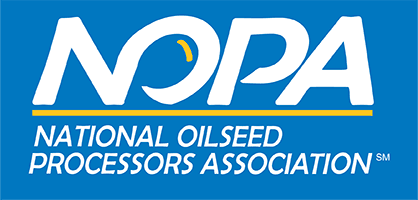NOPA Urges Treasury to Prioritize Emissions Parity and Domestic Feedstocks in 45Z Guidance and Hails Introduction of Legislation to Address these Critical Issues
NOPA calls for Certainty to Support U.S. Farmers, Strengthen Domestic Crushing and Biofuel Industries, and Prevent Market Disruptions
WASHINGTON, April 10, 2025 – The National Oilseed Processors Association (NOPA) today urged the U.S. Department of Treasury to refine the Section 45Z Clean Fuel Production Credit (45Z) to be more workable for U.S. farmers, feedstock suppliers, and biofuel producers, enabling them to be rewarded for supporting American energy dominance and reducing the trade deficit. In comments to Treasury NOPA emphasized the need for policy certainty, prioritization of domestic feedstocks, and fair emissions calculations to ensure a robust and sustainable future for U.S. agriculture and biofuel production.
“Today, billions of dollars of investments –– and our farmer customers’ livelihoods –– are hanging in the balance while we await clarity on this tax credit,” said NOPA President and CEO Devin Mogler. “ILUC is an arbitrary penalty that acts as a hidden tariff on American farmers and only serves to incentivize foreign competitors with U.S. tax dollars. The Treasury Department has an opportunity to lead the way by aligning guidance with real world practices and determine if American-grown biofuel feedstocks will have a reliable domestic market or continue to be undercut by feedstock imports from China and other foreign competitors.”
NOPA outlined several key policy priorities, including:
- Prioritizing Domestic Feedstocks- To support American agriculture and renewable fuel production, Treasury must prioritize domestic feedstocks and maintain strict limitations on non-U.S. pathways, including an expansion of these limitations to tallow, imports of which have escalated following the notice of intent to propose rulemaking that included a prohibition of imported ‘UCO’ qualifying for the credit in on-road applications.
- ILUC- Additionally, NOPA recommends Treasury work with the EPA to remove the indirect land use change (ILUC) penalty and ensure emissions calculations reflect accurate environmental impact data.
- Adapting Renewable Fuel Standard (RFS) Fuel Pathways- NOPA urges Treasury to align the 45Z emissions rate methodology with the EPA’s Renewable Fuel Standard (RFS) framework, creating consistency and providing a safe harbor for advanced biofuels, reducing regulatory uncertainty and strengthening market stability.
- Incorporating On-Farm Conservation Practices to 45Z- NOPA supports Treasury’s efforts to integrate climate-smart agriculture practices into the 45Z credit framework, but calls for a broader range of qualifying conservation practices and additional crop pathways, including winter oilseeds.
- Clarifying Technical Details- To prevent unnecessary market disruptions, NOPA calls on Treasury to clarify that the sale of biofuels to third-party marketers qualifies under 45Z. Additionally, with the 45Z credit already in effect as of January 1, 2025, NOPA stresses the urgent need for Treasury to finalize guidance promptly.
Also today, NOPA hailed the introduction of bipartisan legislation to support renewable fuels produced from domestic feedstocks. The Farmer First Fuel Incentives Act, introduced by Sens. Roger Marshall (R-KS) and Amy Klobuchar (D-MN) would restrict eligibility for the Section 45Z Clean Fuel Production Tax Credit to fuels produced from domestic feedstocks, eliminate the ILUC penalty and extend the tax credit through 2034.
“American tax incentives should support American farmers — not put them at a disadvantage. Ensuring that only domestic feedstocks such as U.S.-grown soybeans qualify for U.S. tax credits is a straightforward way to strengthen our domestic supply chain and rural economy,” added Mogler. “At the same time, eliminating the outdated and flawed ILUC penalty removes an arbitrary barrier that unfairly punishes U.S. producers while benefiting foreign competitors. We appreciate Senators Marshall and Klobuchar for their leadership to ensure the Clean Fuel Production Credit works as intended — to support American agriculture and American energy.”
Read NOPA’s comments here
###
Organized in 1930, the National Oilseed Processors Association (NOPA) represents the U.S. soybean, canola, flaxseed, safflower seed, and sunflower seed-crushing industries. NOPA’s membership is engaged in the processing of oilseeds for meal and oil that are utilized in the manufacturing of food, feed, renewable fuels, and industrial products. NOPA’s 18 member companies operate over 70 softseed and soybean solvent extraction plants across 21 states, crushing over 95% of all soybeans processed in the United States, the equivalent to more than 2 billion bushels annually. More information at www.NOPA.org
###

